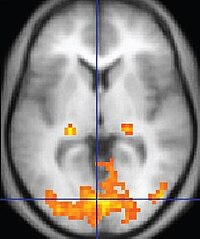
Photo from wikipedia
Electroencephalogram (EEG) is widely used to monitor the brain activities. The manual examination of these signals by experts is strenuous and time consuming. Hence, machine learning techniques can be used… Click to show full abstract
Electroencephalogram (EEG) is widely used to monitor the brain activities. The manual examination of these signals by experts is strenuous and time consuming. Hence, machine learning techniques can be used to improve the accuracy of detection. Nowadays, deep learning methodologies have been used in medical field to diagnose the health conditions precisely and aid the clinicians. In this study, a new deep one-dimensional convolutional neural network (1D CNN) model is proposed for the automatic recognition of normal and abnormal EEG signals. The proposed model is a complete end-to-end structure which classifies the EEG signals without requiring any feature extraction. In this study, we have used the EEG signals from temporal to occipital (T5–O1) single channel obtained from Temple University Hospital EEG Abnormal Corpus (v2.0.0) EEG dataset to develop the 1D CNN model. Our developed model has yielded the classification error rate of 20.66% in classifying the normal and abnormal EEG signals.
Journal Title: Neural Computing and Applications
Year Published: 2018
Link to full text (if available)
Share on Social Media: Sign Up to like & get
recommendations!